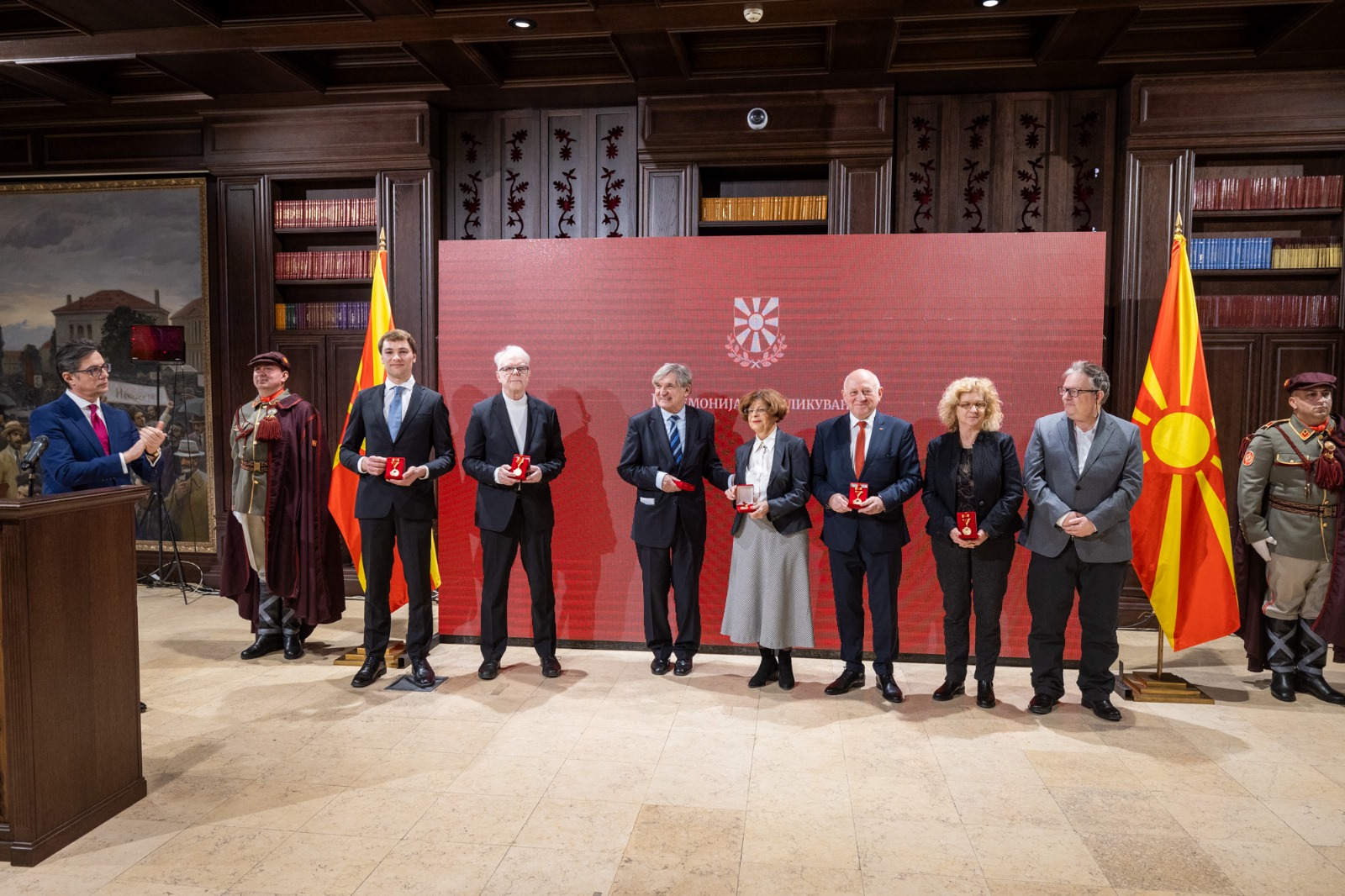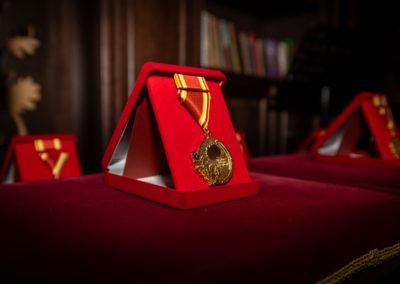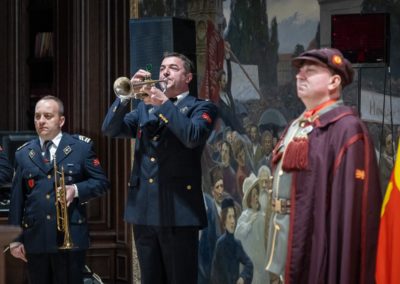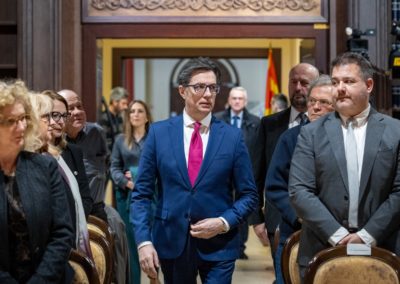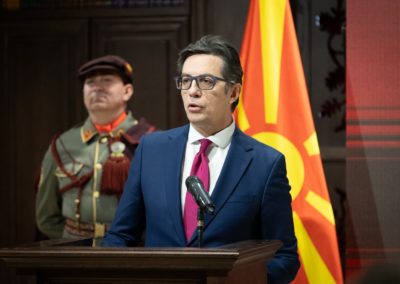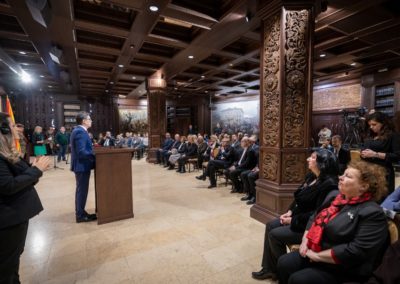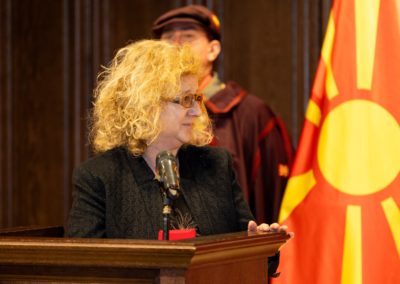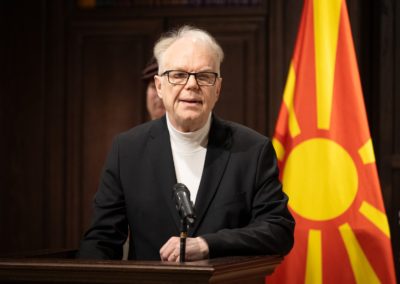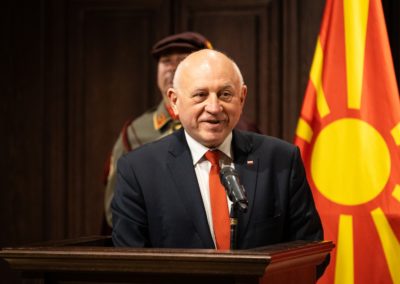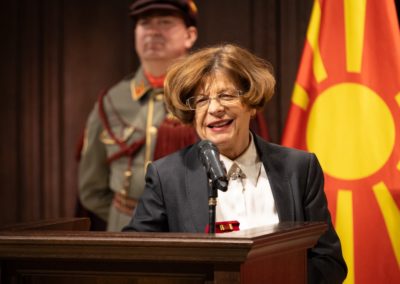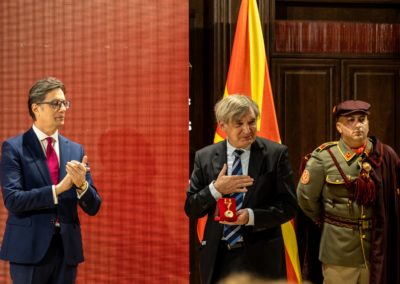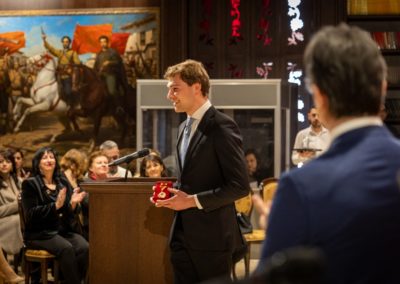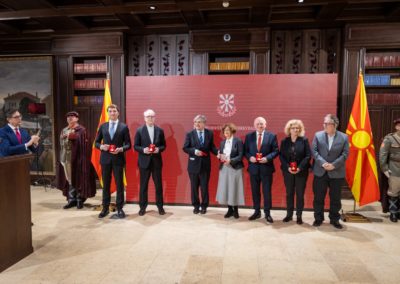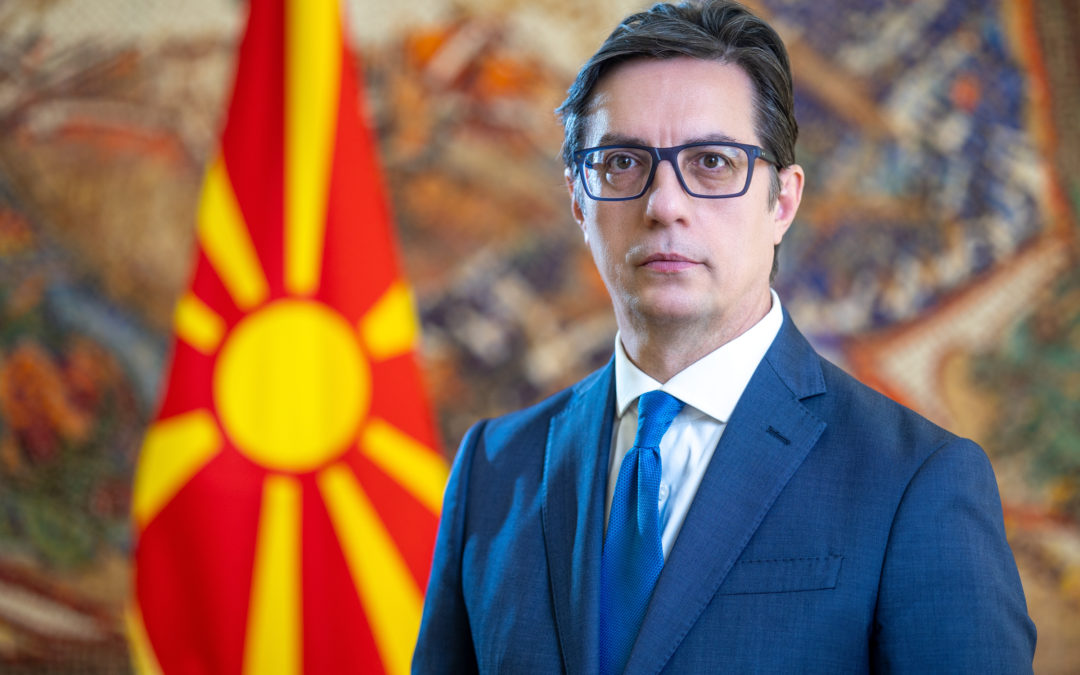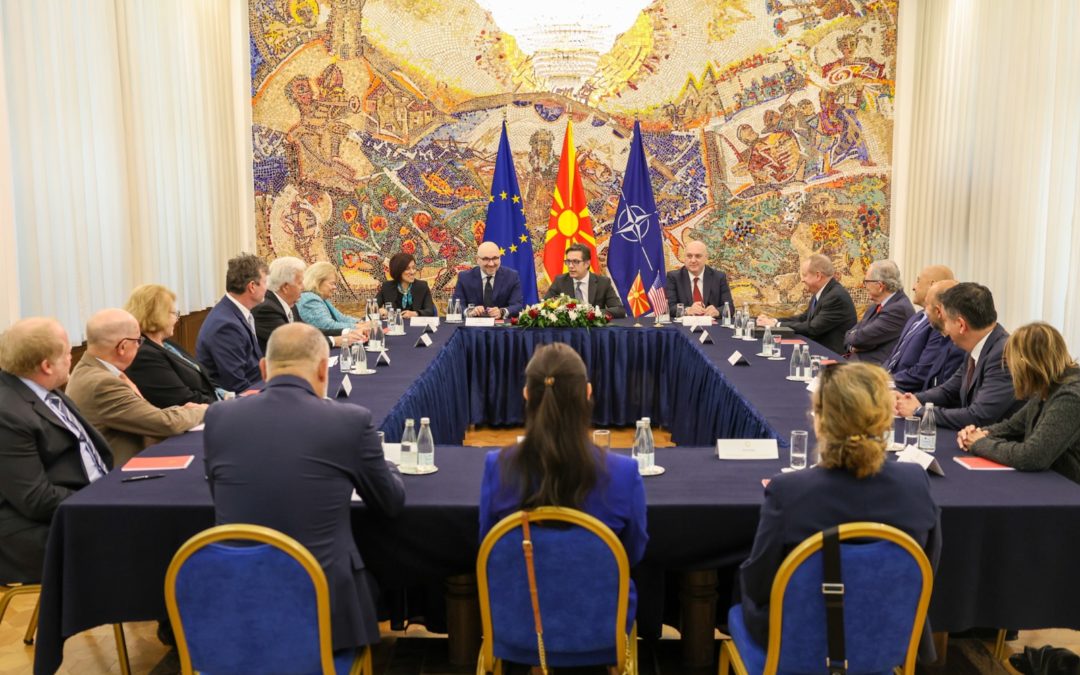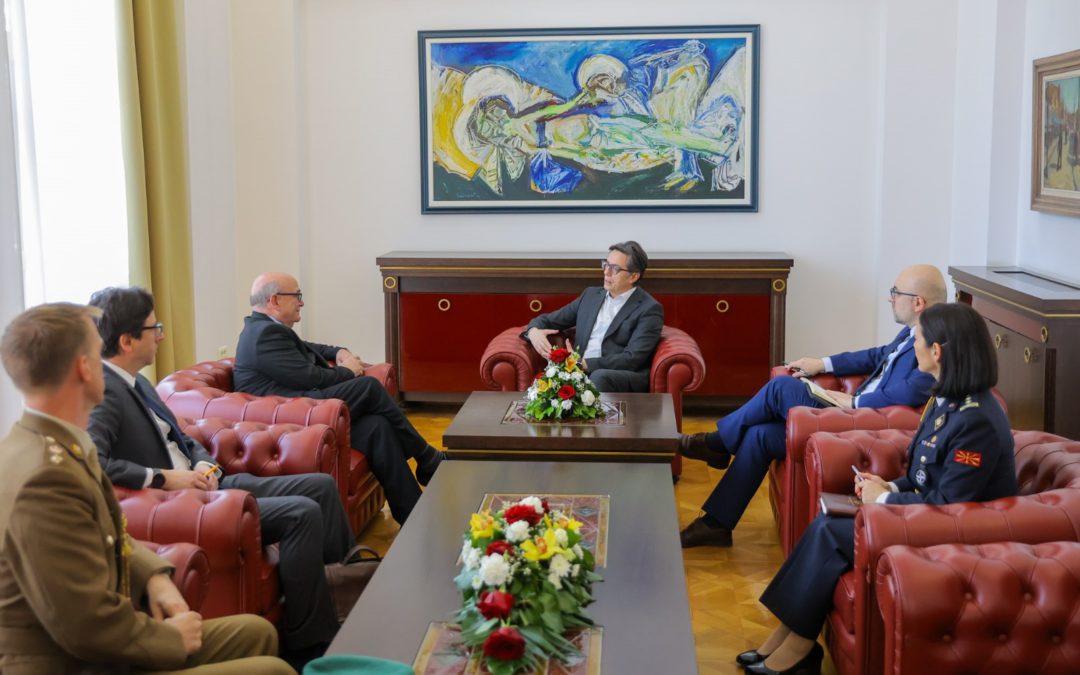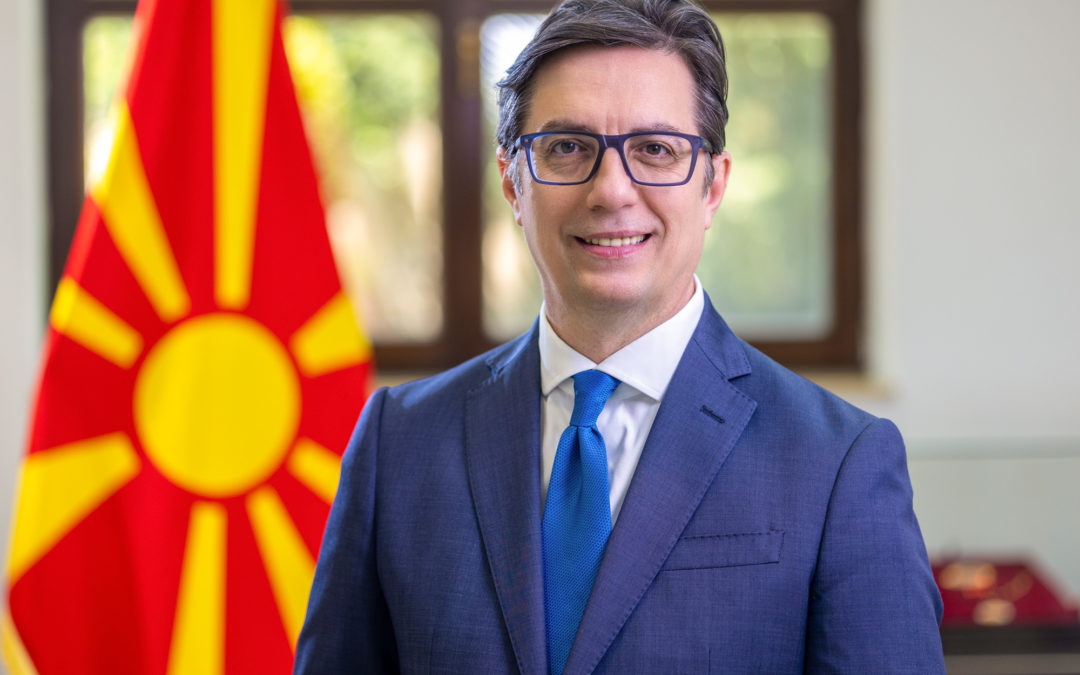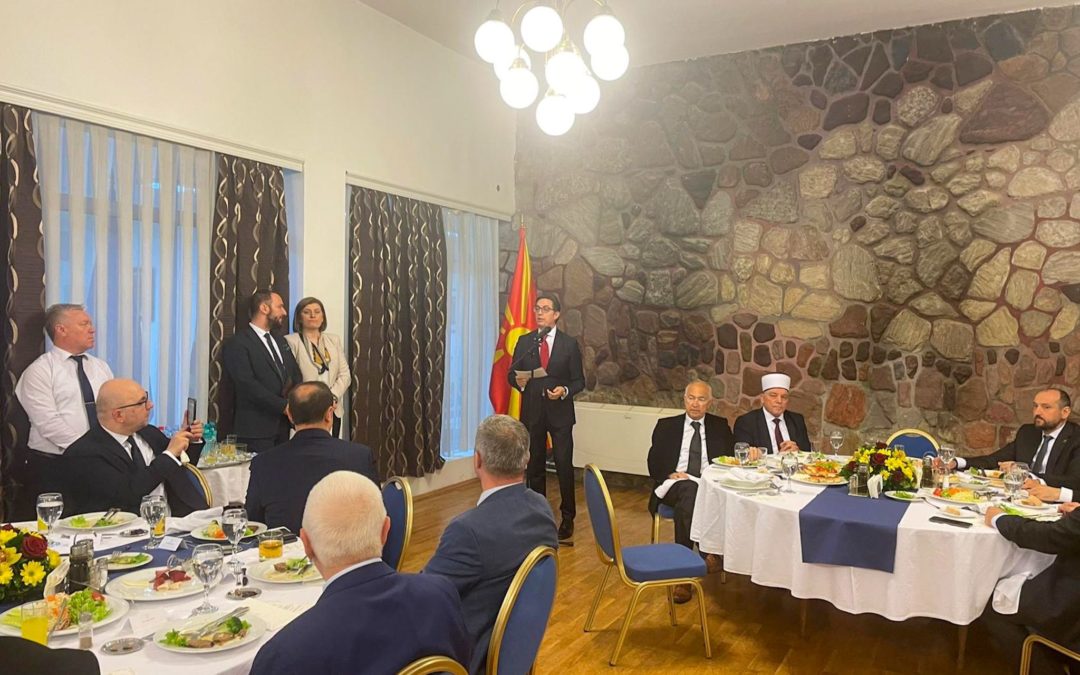President Stevo Pendarovski awarded the Macedonian Language and Culture Promoters Zlatko Kramaric, Zuzana Topolinska, Jouko Lindstet, Jerzy Rusek (posthumously), Krzysztof Wroclawski (posthumously) and Dalibor Brozovic (posthumously) with the Medal of Merit for the Republic of North Macedonia at a ceremony held at the Museum of the Macedonian Struggle for Independence.
Zlatko Kramaric is distinguished for his invaluable contribution to the affirmation of the Macedonian language and Macedonian culture, for his ambassadorial activity in connecting Macedonian and Croatian scientific institutions, as well as in bringing the Republic of North Macedonia closer to the Euro-Atlantic initiatives.
Zuzana Topolinska is distinguished for her invaluable contribution to the affirmation of the Macedonian language and Macedonian culture, as one of the most active Macedonian scholars whose scientific works are an incentive for a large number of domestic and foreign scientists.
Jouko Lindstedt is distinguished for his immense contribution to the Macedonian language and Macedonian culture, leaving a lasting mark as one of the most outstanding Macedonian promoters in the Scandinavian countries.
Jerzy Rusek is posthumously distinguished for his exceptional contribution to the development and maintenance of Macedonian language and literature studies at the University of Krakow, which contributed to the affirmation of the Macedonian language. His scientific works and conferences are still an incentive for the young generations of Macedonians.
Krzysztof Wroclawski is posthumously distinguished for his invaluable services to Macedonian studies and for the dedicated study and research of Macedonian folklore and the Macedonian folk storytelling tradition.
Dalibor Brozovic is posthumously distinguished for his extremely significant contribution to the study and affirmation of the Macedonian language and its dialects, which he has committed to Macedonian culture and Macedonian linguistics by zealously promoting it at the international level.
Below is the integral address of President Pendarovski at the solemn ceremony.
Dear attendees,
Ladies and gentlemen,
This 2024 is the year of two great jubilees. 150 years since the birth of Krste Petkov Misirkov and 80 years since the First Session of ASNOM and the founding of the modern Macedonian state.
These two anniversaries are intrinsically linked. According to the German Macedonian scholar Wolf Oschlies, modern Macedonia is Misirkov’s Macedonia because it was built on his principles written in the book “On Macedonian Matters”.
It is no coincidence that Blaze Koneski always revisits that book “because exactly there for the first time the identity of the Macedonians is established so clearly and unequivocally”, as well as the importance of the Macedonian literary language for our national consolidation. It is no coincidence that one of the first solutions of ASNOM Macedonia was the introduction of Macedonian as the official language of the Macedonian state, and one of the first national undertakings was the completion of its codification and standardization.
These two great anniversaries provide the context for today’s solemn event, at which we say thank you to six deserving foreign Macedonian language and culture promoters. I say foreign, although they are ours, because anyone who has dedicated his life to the study and promotion of the Macedonian language wealth, of our complete homeland, cannot be considered a foreigner, but a native.
Esteemed excellences,
For Slavists, the Macedonian language has always been a challenge, both academically and personally.
I shall start with the scientific. The Macedonian language and Macedonian literacy have a long temporal and spatial continuity that begins in the dawn of Slavic literacy. Due to the ability to adapt to changes, to evolve and develop into numerous dialects, the Macedonian language survived even in the most unfavorable conditions and grew into a priceless record of our culture and a treasure of our identity.
The Macedonian language has long been the subject of research by the most famous foreign Slavists, among whom, special place has the first lady of the Macedonian studies, academician Zuzana Topolinjska, Member of the most important commissions of the International Slavic Committee dedicated to grammatical structures and the General Slavic Atlas, Academician Topolinjska is one of the biggest promotors of the Macedonian language in Poland and in the world. She became so empathetic with the Macedonian studies that she has been living and working here for 40 years, acquired Macedonian citizenship and became a regular member of MANU, where she managed for many years the Research Center for Areal Linguistics “Bozidar Vidoeski”.
A true passion for the Macedonian language was also nurtured by her compatriot, the late Professor Krzysztof Wroclawski from the University of Warsaw. A decisive moment in his scientific activity is the field research in Peshtani, where he collected about 130 folk works, half of which were from only one storyteller. In that way, Wroclawski went through a similar experience as the Miladinovci Brothers who testify that in Struga only one girl told them as many as 150 songs. Faced with the rich Macedonian folklore, Professor Wroclawski fell in love with Macedonia so much that he devoted himself to the Macedonian folklore and became the most outstanding foreign researcher and promoter of our national creativity.
A similar life and professional path was paced by the Finnish Slavist, Professor Jouko Lindstedt from the University of Helsinki. Professor Lindstedt is honest when he says that he did not choose Macedonian studies, but Macedonian studies chose him. In 2003, in the Greek Patriarchal Library in Alexandria, he discovered the Konikovo Gospel – the oldest known text in modern Macedonian language. This gospel, which originates from the end of the 18th or the beginning of the 19th century, is the missing link in the genealogy of the Macedonian language. Professor Lindstedt is pleased to point out that it was Macedonian studies that gave him the most interesting research challenges in his rich Slavic career.
However, studying the Macedonian language is not only a scientific, but also a personal challenge, because Macedonian language and culture promoters share the fate of the language they study. There is almost no Macedonian, especially from the older generation, who has not experienced unpleasant pressures from the centers that deny the Macedonian language and identity.
Illustrative is the example of one of the founders of Macedonian studies in Croatia, Academician Dalibor Brozović, who made a huge contribution to the study of the Macedonian language and its dialects, is illustrative. As the author of numerous Macedonian papers, he fought for the Macedonian language and cause at many international scientific conferences, opposing the unscientific Bulgarian theses against the Macedonian language, people and culture.
The second example is related to the Polish Slavist, Bulgarian and Macedonian language and culture promoter, Jerzy Rusek, professor at the Institute of Slavic Philology at the Jagiellonian University in Krakow. Despite the strong political pressure from the then People’s Republic of Bulgaria, Professor Rusek did not allow the Macedonian language course to be abolished at the University. On the contrary, he contributed to maintaining and protecting Macedonian studies and became a pioneer in the scientific comparison between the Bulgarian and Macedonian languages.
Finally, our great friend, Ambassador Zlatko Kramaric, is with us, one of the best connoisseurs of Macedonian literature in Croatia and the first professor of Macedonian literature and culture at the Faculty of Philosophy in Osijek. He has been dealing with Macedonian issues for decades and tirelessly contributes to the cultural connection between the Republic of Croatia and North Macedonia. Because of his love for the Macedonian language and literature, Ambassador Kramaric paid a price that also affected his diplomatic career.
Esteemed Excellences,
Scientific activity requires courageous opposition to unprincipled and unscientific pressures. Therefore, I am deeply convinced that we could also consider these medals of merit as medals of courage.
Macedonian promoters are led by the unequivocal fact that in the international scientific community, the place and importance of the Macedonian language and its dialects have never been questioned. The Macedonian language is an undeniable linguistic, historical and cultural fact, recognized and equal to other languages in Europe and the world.
The work of each of these six Macedonian language and culture promoters increases our responsibility to preserve the Macedonian language. This implies active support of domestic and international scientific research and projects in all areas related to the Macedonian language and its dialects. To invest in the Macedonian education system, in studies, departments, lectureships and publishing, to invest in Macedonian promoters in the country and abroad, especially through the International Seminar on Macedonian Language, Literature and Culture.
Therefore, yesterday I signed the Decree for promulgation of the Law on the Use of the Macedonian Language, which was recently adopted in the Parliament. With that, we continue the vow of Misirkov who reminded us that “kindness towards the national language is our duty and our right. We are obliged to cherish our language, because it is ours, just as the homeland is ours”.
Ladies and gentlemen,
We can only be pleased by the fact that we are not alone in this endeavor because the faithful guardians and promotors of the Macedonian language, our Macedonian friends are also with us.
Thank you.
